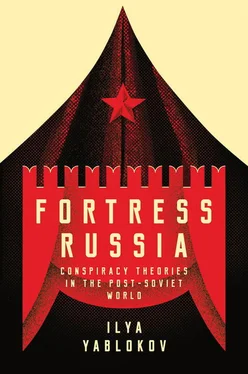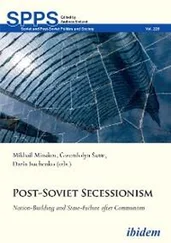1 ...7 8 9 11 12 13 ...77 Among the topics which Gefter’s work addressed were the nature of Russian totalitarianism and the possibility of reconciliation with the Stalinist past. This was his major consideration in the 1980s and became even more significant when Gorbachev’s reforms started the process of democratization. In Gefter’s view, although Khrushchev began a process of national reconciliation in the 1950s in relation to the repressions of the Stalin era, the results were very limited. A lack of clarity in Khrushchev’s discourse about the causes of the Great Terror allowed for the later expression of nostalgia for the supposed stability of the Stalin era and for the ‘glorious past’ when a strong leader ruled the country (Gefter, 2013). In Gefter’s view, although there had been opportunities to debate these complicated feelings about the past during perestroika , no national consensus on the origins of the Stalinist repression had emerged.
Gefter thought that the Stalinist tradition of hunting out internal and external enemies could be reintroduced and used for political purposes. In his dialogue with Pavlovskii at the end of the 1980s, he stated that Stalin had only ‘died yesterday’ (Gefter, 1991), by which he meant that Soviet society had still not grasped the origins of the repressions and held some disconcertingly positive views about the totalitarian past. Gefter argued that late Soviet and post-Soviet political elites used certain aspects of Stalinist ideology in their political discourse, thereby reinforcing a positive attitude towards the totalitarian past and applying this to the current political situation. In Gefter’s view, Yeltsin’s desire to hold on to power resulted in him using totalitarian rhetoric against his political enemies (Pavlovskii, 2014, pp. 132–7, 218–23).
Yeltsin’s signing of the Belovezha accords in December 1991 signified the collapse of the Soviet Union, which, in his own words, were a turning point in Pavlovskii’s life (Pavlovskii and Filippov, 2013, p. 94). The political and intellectual crisis of the 1990s, which was accompanied by a crisis in national self-identification, led Pavlovskii to conclude that the state could be saved by the implementation of ‘the intellectual mechanism which would help generate Russian power (vlast’)’ (Chudodeev, 2012). It is very likely that Pavlovskii was inspired by Gefter’s ideas in his deployment of various narratives about the past in the Kremlin’s political campaigns. He admitted that he knew more about the history of Stalin’s totalitarian regime than any other period of Russian or Soviet history, which helped him employ narratives from the Stalin era in political campaigns of the 1990s and, most importantly, to strengthen Putin’s regime after 2000 (Pavlovskii and Filippov, 2013, p. 106).
The ideological underpinnings of Putin’s regime – which Pavlovskii played an important role in developing – were the representation of the Soviet collapse as the most tragic event in twentieth century history and the creation of a strong state which was supported by most Russian people. These two narratives framed many of Pavlovskii’s arguments and, as we see later, were utilized by the political leadership to spread conspiracy fears. In Pavlovskii’s view the Belovezha accords destroyed both the state and the nation while the Soviet Union’s successor, the Russian Federation, was, throughout the 1990s, an artificial ‘state formation’ ( gosudarstvennoe obrazovanie ). In his essay A Blind Spot ( Slepoe piatno ) (Pavlovskii, 1995), Pavlovskii criticized Russian society for having a lack of national sentiment about the collapsed Soviet state, and described post-Soviet Russia as ‘the Soviet Union dripping with blood’. In his view, the emergence of a new Russian nation would take place only when the state acquired power (vlast’) and the nation recognized its past glory.
Following Putin’s victory in the presidential elections of 2000, Pavlovskii contended that he was ‘introducing a state’ in Russia ( Putin vvodit v Rossii gosudarstvo ) after years of chaos, and uniting most of the Russian people (Pavlovskii, 2000). His use of the verb ‘introduce’ in relation to the state requires particular consideration. A law or a policy can be introduced; but ‘introducing a state’ has to be interpreted as a metaphor which aims to personalize political power. Similar metaphors were used in the past in relation to prominent political leaders such as Peter the Great. Hence it can be argued that Pavlovskii and other pro-Kremlin intellectuals were attempting to equate Putin to remarkable historical figures of the past to boost the popularity of the new president.
The stability of the regime from 2000 onwards was partly based on mass public support; around 70 per cent of the population supported Putin throughout the 2000s. This was a phenomenon that Pavlovskii described as ‘Putin’s majority’ (Regnum, 2003). In their effort to bolster the image of Putin as a national leader, Pavlovskii and other public intellectuals used populist discourse to bring together highly diverse groups and ensure social cohesion. As Panizza noted (2005, pp. 12–13, 21), a populist leader emerges – an ordinary person to whom extraordinary abilities are attributed – when a nation suffers a collapse of political and social institutions, or when trust in existing political elites is destroyed because of widespread corruption. Putin’s emergence as president in 2000 took place in just such a context, when Yeltsin’s popularity was at its lowest level and people despaired of the future (Doktorov et al., 2002). As Pavlovskii stated in 2000:
This is a breakthrough of the masses who were not represented on the political scene after 1991–1993. And Putin is their leader…. Those who elected Putin perceive him to be a leader of the opposition, which has taken power in Russia. For Putin’s majority, Putin is a leader of the party in opposition to the old regime. (Tregubova, 2000)
This populist juxtaposition of the new Russian president and the political elites of Yeltsin’s Russia helped to discursively unite different social groups into ‘the people’, Putin supporters. Moreover, the notion that Putin had led the opposition to victory helped create the impression that his election had launched a new era of history, leaving Yeltsin’s rule behind. The drama of the Soviet collapse, and exploitation of people’s fears about the possibility of economic failure and of further territorial disintegration of the country formed the predominant discourse of this period, which was generated by the Kremlin and was aimed at building support for Putin’s regime. Later, in the 2010s, Pavlovskii admitted that Putin’s majority had indeed become a ‘truncheon [to be used] against our political rivals’ (Pavlovskii, 2012, p. 74). The Kremlin started to use this ‘truncheon’ in the 2000s to legitimize governmental policies and delegitimize its opponents. The division of society into Putin’s majority and its enemies became a dominant political tactic.
Another trope in Pavlovskii’s narrative was the comparison of the new Russian president with Stalin. Pavlovskii’s interpretation of Stalinism, which he probably derived from conversations with Gefter, was used in the struggle against the oligarchs at the beginning of Putin’s term in 2000. Two fugitive oligarchs, Boris Berezovskii and Vladimir Gusinskii, who were now perceived as Putin’s opponents, were likened to Lev Kamenev and Grigorii Zinov’ev, leaders of the Bolshevik party who were executed during the Great Purge in the 1930s on charges of conspiracy against the state. As Pavlovskii described it, Putin’s enemies acted against the will of the people and thus were not only Putin’s enemies but were also hostile to society at large (Tregubova, 2000).
Читать дальше
Конец ознакомительного отрывка
Купить книгу












